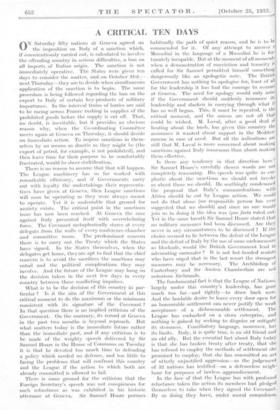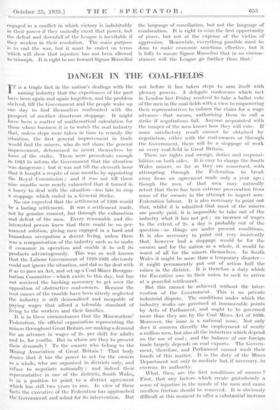A CRITICAL TEN DAYS
ON Saturday fifty nations at Geneva agreed on the imposition on Italy of a sanction which, if conscientiously carried out, is calculated to involve the offending country in serious difficulties, a ban on all imports of Italian origin. The sanction is not immediately operative. The States were given ten days to consider the matter, and,on October 31st.7.– next Thursday—they are to decide when simultaneous application of the sanction is to begin.. The same procedure is being followed regarding the ban on the . export to Italy of certain key-products of military importance. In the interval trains of lorries are said to be racing across France rushing in supplies of the prohibited goods before the supply is cut off. That, no doubt, is inevitable, but it provides, an obvious reason why, when the Co-ordinating Committee meets again at Geneva on Thursday, it should decide on immediate action. To impose sanctions in them- selves by no means as drastic as they might be (the export of petrol, for example, is not prohibited), and then leave time for their purpose to be comfortably frustrated, would be sheer stultification.
There is no reason to assume that that will happen. The League machinery has so far worked with remarkable efficiency, and if Governments carry out with loyalty the undertakings their representa- tives have given at Geneva, then League sanctions will soon be operating as they were always meant to operate. Yet it is undeniable that ground for anxiety exists. The critical point in the sanctions issue has now been reached. At Geneva the case against Italy presented itself with overwhelming force. The Covenant metaphorically stares at every delegate from the walls of every conference-chamber and committee room. The predominant concern there is to carry out ,the Treaty which the States have signed. In the States themselves, when the delegates get home, they are apt to find that the chief concern is to avoid the sacrifices the sanctions may entail and the political complications they may involve. And the future of the League may hang On the decision taken in the next few days in every country between those conflicting impulses.
What is to be the decision of this country in par- ticular ? Is it the aim of the Government at this critical moment to do the maximum or the minimum consistent with its signature of the Covenant ? In that question there is no implied criticism of the Government. On the contrary,,its record at Geneva in the past two months is beyond reproach. But what matters today is the immediate future rather than the immediate past, and if any criticism is to be made of the weighty speech delivered by Sir Samuel Hoare in the House. of Commons on Tuesday it is that he devoted too much time to defending a policy which needed no defence, and too little to facing the problems that will confront this country and the League if the action to which both are already committed is allowed to fail.
There is some ground for the criticism that the Foreign Secretary's speech was not conspicuous for such robustness as was exhibited in his historic utterance. at Geneva, Sir Samuel Hoare • pursues habitually the path of quiet reason, and he is to be commended for it. Of any attempt to answer a Mussolini in the language of a Mussolini he is fore tunately incapable. But at the moment of all moments when a demonstration of conviction and tenacity is called for Sir Samuel permitted himself something . dangerously like an apologetic note. The British Government has nothing to apologise for, least of all for the leadership it has had the courage to assume at Geneva. The need for apology would only arise if the Government should suddenly renounce its leadership and slacken in carrying through what it has so well begun. This, it must be repeated, is the critical moment, and the omens are not all that could be wished. M. Laval, after a good deal of beating about the bush, has given this country the assurance it wanted about support in the Mediter- ranean in case of need. But all the indications are still that M. Laval is more concerned about making sanctions against Italy innocuous than about making them effective. • Is there any tendency in that direction here ? Sir Samuel Hoare's carefully chosen words are not completely reassuring. His speech was quite as em- phatic about the sanctions we should not invoke as about those we should. He scathingly condemned the proposal that Italy's communications with Africa should be cut by League action. We could not do that alone (no responsible person has ever suggested. that we should) and since no one would join us in doing it the idea was ipso facto ruled out. Yet in the same breath Sir Samuel Hoare stated, that no military measures had been discussed. Are they never in any circumstances to be discussed ? the choice seemed to lie between the defeat of the League and the defeat of Italy by the use of some such measure as blockade; would the British Government lead in advocating surrender ? It is not hot-headed zealots who have urged that in the last resort the strongest measures may be necessary. The Archbishop of Canterbury and Sir Austen Chamberlain are not notorious firebrands.
The fundamental fact is that the League of Nations, largely under this country's leadership, . has gone much too far—and rightly—to draw back now. And the laudable desire to leave every door open for an honourable ,settlement can never justify the weak acceptance- of . a dishonourable settlement. The League has embarked on a stern enterprise, and nothing is gained by seeking to disguise or mitigate its sternness.. Conciliatory language, moreover, has its limits. Italy, it is quite true, is an old friend and an old ally. But the essential fact about Italy today is that she has .broken treaty after treaty, that she has refused to employ the methods of settlement she promised to employ, that she has committed an :act of utterly unjustified aggression—as the judgement of 52 nations has testified—on a defenceless neigh- bour for purposes , of lawless aggrandisement.
In the face of that the, League has with profound reluctance taken the. action its members had pledged themselves, to take when they signed the Covenant. By so doing, they have, under moral compulsion;
engaged in a conflict in which victory is indubitably, in their power if they unitedly exert that power, but the defeat and downfall of the League is inevitable if they weaken in their resolution. The maid purpose is to' end the war, but it must be ended on terms `which will show that injustice has not been allowed to triumph. It is right to use toward Signor Mussolini the language of conciliation, but not the language of 'cordenation. It is right to seize the first opportunity of peace, but not at the expense of the victim of aggression. Meanwhile, everything possible must be "dene to make economic sanctions effective, but it is folly to assure Signor Mussolini that in no circum- stances will the League go further than that:



























































 Previous page
Previous page